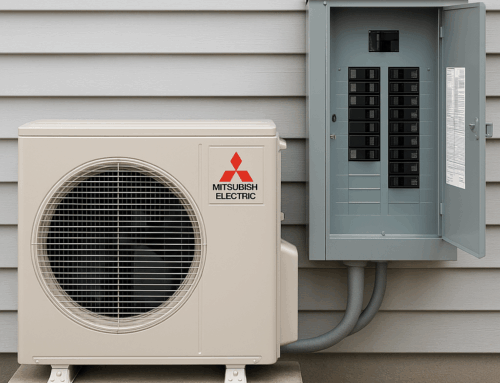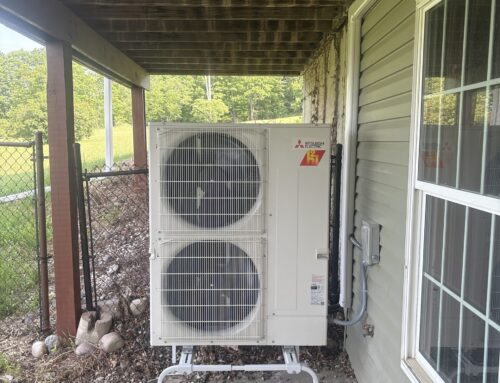Efficiency and Savings
Mitsubishi heat pumps in Vermont are known for their exceptional efficiency and cost savings, which are especially valuable in Vermont’s diverse climate. These systems use advanced technology to provide efficient heating and cooling, ensuring that homeowners enjoy comfortable indoor temperatures year-round while reducing energy consumption.
Air Conditioning Efficiency
- SEER Ratings: Mitsubishi heat pumps boast high Seasonal Energy Efficiency Ratio (SEER) ratings, often exceeding 20. This high efficiency means lower energy bills for cooling during the summer months.
- Inverter Technology: Mitsubishi heat pumps use inverter-driven compressors, which adjust the cooling capacity to match the demand, reducing energy wastage and maintaining a consistent indoor temperature.
Heating Efficiency
- HSPF Ratings: The Heating Seasonal Performance Factor (HSPF) of Mitsubishi heat pumps is equally impressive, often reaching up to 12. This indicates superior efficiency in providing warmth during Vermont’s cold winters.
- Cold Climate Performance: Mitsubishi heat pumps are designed to operate efficiently even in temperatures as low as -13°F, making them ideal for Vermont’s harsh winters.
Cost Savings
Energy Bills
- Reduced Energy Consumption: Homeowners can see a significant reduction in their energy bills due to the high efficiency of Mitsubishi heat pumps. On average, switching from traditional heating systems to a Mitsubishi heat pump can save up to 30-40% on heating costs.
- Real-World Examples: For a typical Vermont home, this could translate to annual savings of $500 to $1,500, depending on the size of the home and the current heating system.
Rebates and Tax Credits
- Federal Tax Credits: Homeowners can take advantage of federal tax credits for installing energy-efficient heat pumps. The federal government offers a tax credit of up to 26% of the installation cost for qualifying systems.
- State Rebates: Vermont offers additional incentives through programs like Efficiency Vermont, which provides rebates of up to $1,200 for the installation of high-efficiency heat pumps.
- Utility Company Incentives: Local utility companies often have rebate programs. For example, Green Mountain Power offers rebates ranging from $400 to $1,200 per heat pump unit.
Environmental Impact
Reduced Carbon Footprint
- Lower Emissions: Mitsubishi heat pumps use electricity, which can be sourced from renewable energy, unlike fossil fuel-based heating systems. This switch can significantly reduce a home’s carbon footprint.
- Energy Star Certification: Many Mitsubishi heat pumps are Energy Star certified, meaning they meet strict guidelines for energy efficiency set by the U.S. Environmental Protection Agency.
Sustainable Heating and Cooling
- Refrigerant Use: Mitsubishi heat pumps use environmentally friendly refrigerants like R-410A, which have lower global warming potential compared to older refrigerants.
Comfort and Convenience
Year-Round Comfort
- Dual Functionality: Mitsubishi heat pumps provide both heating and cooling, eliminating the need for separate systems and ensuring year-round comfort.
- Zoned Heating and Cooling: These systems allow for zoned heating and cooling, meaning different areas of a home can be maintained at different temperatures, enhancing comfort and saving energy.
Quiet Operation
- Low Noise Levels: Mitsubishi heat pumps are designed to operate quietly, with some models producing sound levels as low as 19 decibels, making them quieter than a typical whisper.
Technology and Features
Advanced Control Options
- Smart Thermostats: Mitsubishi heat pumps can be paired with smart thermostats for enhanced control. Homeowners can adjust settings remotely via smartphone apps, ensuring optimal comfort and efficiency.
- Wi-Fi Connectivity: Many models come with built-in Wi-Fi connectivity, allowing for easy monitoring and control from anywhere.
Durability and Reliability
- Built to Last: Mitsubishi heat pumps are known for their durability and long lifespan. With proper maintenance, these systems can last 15-20 years.
- Warranty: Mitsubishi offers extensive warranties on their heat pumps, often covering parts for up to 10 years, providing homeowners with peace of mind.
Rebates and Incentives for Vermont Homeowners
Federal Tax Credits
- Eligibility: Homeowners who install Mitsubishi heat pumps may be eligible for federal tax credits. These credits can cover up to 26% of the installation cost, making it a financially attractive option.
- Claim Process: To claim this credit, homeowners need to complete IRS Form 5695 when filing their federal tax returns.
State and Local Rebates
- Efficiency Vermont: This program offers substantial rebates for energy-efficient home improvements, including heat pump installations. Homeowners can receive up to $1,200 per unit.
- Green Mountain Power: This utility company provides rebates that range from $400 to $1,200, depending on the efficiency and type of heat pump installed.
- Burlington Electric Department: Residents of Burlington can benefit from rebates of up to $800 for installing a qualifying heat pump system.
Example of Cost Savings
Consider a typical Vermont home that spends $2,000 annually on heating with an oil furnace. By switching to a Mitsubishi heat pump, the homeowner could save 30-40% on heating costs, which translates to $600-$800 per year. Additionally, the homeowner might receive a $1,200 rebate from Efficiency Vermont and a 26% federal tax credit on the installation cost of $10,000, which equals $2,600. The combined savings and incentives significantly reduce the overall cost, making the transition to a Mitsubishi heat pump a smart financial decision.
Heat Pump Technology
How Mitsubishi Heat Pumps Work
- Heat Transfer: Unlike traditional heating systems that generate heat, heat pumps transfer heat from one place to another. In heating mode, they extract heat from the outside air (even in cold temperatures) and transfer it indoors. In cooling mode, the process is reversed.
- Inverter Technology: This technology allows the heat pump to adjust its output to match the heating or cooling demand precisely, leading to improved efficiency and comfort.
Features of Mitsubishi Heat Pumps
- Hyper-Heating INVERTER® (H2i®): This technology ensures the heat pump operates efficiently in extremely cold conditions, maintaining capacity down to -13°F.
- Multi-Zone Systems: These systems can heat and cool multiple zones or rooms independently, providing customized comfort and energy savings.
- i-See Sensor™: This sensor detects temperature variations in a room and adjusts the airflow to maintain even temperatures, enhancing comfort.
Case Studies: Savings and Comfort
Residential Case Study: The Johnson Family
- Location: Burlington, VT
- Previous System: Oil Furnace
- Annual Heating Cost: $2,500
- Mitsubishi Heat Pump Installation Cost: $10,000
- Rebates and Credits: $1,200 (Efficiency Vermont) + $2,600 (Federal Tax Credit)
- Annual Savings: $800
- Payback Period: 7.5 years
The Johnson family experienced immediate comfort improvements with their new Mitsubishi heat pump, enjoying consistent temperatures throughout their home. They also appreciated the quiet operation and the ability to control the system remotely via their smartphone.
Commercial Case Study: The Maple Lodge
- Location: Stowe, VT
- Previous System: Propane Heating System
- Annual Heating Cost: $5,000
- Mitsubishi Heat Pump Installation Cost: $20,000
- Rebates and Credits: $2,400 (Efficiency Vermont) + $5,200 (Federal Tax Credit)
- Annual Savings: $2,000
- Payback Period: 6.4 years
The Maple Lodge, a small inn, saw a significant reduction in heating costs after installing Mitsubishi heat pumps. Guests also commented on the improved comfort and quieter rooms, enhancing their overall experience.
Environmental Benefits
Reduced Greenhouse Gas Emissions
Switching to a Mitsubishi heat pump can significantly reduce a home’s carbon footprint. Traditional heating systems that rely on fossil fuels emit CO2 and other greenhouse gases. In contrast, heat pumps use electricity, which can be sourced from renewable energy.
Contribution to Renewable Energy Goals
By using heat pumps, homeowners support Vermont’s renewable energy goals. The state aims to source 90% of its energy from renewable sources by 2050, and heat pumps play a crucial role in achieving this target.
Maintenance and Longevity
Maintenance Tips for Mitsubishi Heat Pumps in Vermont
- Regular Cleaning: Keep the outdoor unit clear of debris and regularly clean the filters to ensure optimal performance.
- Annual Checkups: Schedule annual maintenance with a professional technician to inspect and tune up the system.
- Monitor Performance: Keep an eye on the system’s performance and address any issues promptly to avoid major repairs.
Longevity
Mitsubishi heat pumps are designed for durability and long life. With proper maintenance, these systems can last 15-20 years, providing reliable heating and cooling for many years.
Mitsubishi Heat Pumps in Vermont: Choosing the Right System
Factors to Consider
- Home Size and Layout: Choose a system that matches the size and layout of your home for optimal performance.
- Climate: Mitsubishi offers models specifically designed for cold climates, ensuring efficient operation even in Vermont’s harsh winters.
- Energy Efficiency: Look for systems with high SEER and HSPF ratings for maximum energy savings.
Professional Consultation
Consult with a Mitsubishi Elite Contractor, like SCOOP HVAC, to determine the best heat pump system for your home. They can assess your specific needs and recommend the most suitable model.
Financing Programs
Many contractors offer financing programs to make the installation of Mitsubishi heat pumps more affordable. These programs often include low-interest loans or payment plans that spread the cost over several years, making it easier for homeowners to manage the upfront investment.
Green Mountain Power Financing
Green Mountain Power provides financing options for customers installing energy-efficient heat pumps. Homeowners can take advantage of low-interest loans with flexible repayment terms, making it more feasible to upgrade to a Mitsubishi heat pump.
Efficiency Vermont Financing
Efficiency Vermont also offers financing programs that help homeowners cover the cost of energy-efficient home improvements, including heat pump installations. These programs are designed to encourage the adoption of energy-efficient technologies by reducing financial barriers.
Payment Plans
Some contractors provide in-house payment plans that allow homeowners to spread the cost of installation over a set period. This can be a convenient option for those who prefer to pay in smaller, manageable installments.
Advanced Features of Mitsubishi Heat Pumps
Hyper-Heating INVERTER® (H2i®) Technology
Mitsubishi’s Hyper-Heating INVERTER® (H2i®) technology ensures efficient heating performance even in extremely cold climates. This feature allows the heat pump to maintain its heating capacity down to -13°F, making it ideal for Vermont’s harsh winters.
Multi-Zone Systems
Mitsubishi heat pumps offer multi-zone systems that allow homeowners to control the temperature in different areas of their home independently. This zoned heating and cooling approach enhances comfort and reduces energy consumption by only heating or cooling the rooms that are in use.
i-See Sensor™ Technology
The i-See Sensor™ technology in Mitsubishi heat pumps detects temperature variations within a room and adjusts the airflow to maintain even temperatures. This feature ensures consistent comfort throughout the home and helps prevent hot or cold spots.
Quiet Operation
Mitsubishi heat pumps are known for their quiet operation. With sound levels as low as 19 decibels, these systems are quieter than a typical whisper, ensuring minimal disruption to your home environment.
Wi-Fi Connectivity and Smart Controls
Many Mitsubishi heat pumps come with built-in Wi-Fi connectivity, allowing homeowners to control their system remotely via a smartphone app. Smart controls enable users to adjust settings, monitor energy usage, and receive maintenance alerts, all from the convenience of their mobile device.
Enhanced Filtration
Mitsubishi heat pumps are equipped with advanced filtration systems that improve indoor air quality by capturing dust, allergens, and other pollutants. This feature is particularly beneficial for homeowners with allergies or respiratory conditions.
Real-Life Examples of Cost Savings
The Smith Family: Heating and Cooling Savings
- Location: Montpelier, VT
- Previous System: Electric Baseboard Heaters and Window AC Units
- Annual Heating and Cooling Cost: $3,000
- Mitsubishi Heat Pump Installation Cost: $12,000
- Rebates and Credits: $1,200 (Efficiency Vermont) + $3,120 (Federal Tax Credit)
- Annual Savings: $1,200
- Payback Period: 6.6 years
The Smith family saw a dramatic reduction in their annual heating and cooling costs after switching to a Mitsubishi heat pump. They appreciated the consistent comfort and the ability to control their system remotely. The system’s quiet operation was an added bonus, making their home environment more peaceful.
The Brown Family: Year-Round Comfort
- Location: Rutland, VT
- Previous System: Oil Furnace and Window AC Units
- Annual Heating and Cooling Cost: $2,800
- Mitsubishi Heat Pump Installation Cost: $10,000
- Rebates and Credits: $1,000 (Efficiency Vermont) + $2,600 (Federal Tax Credit)
- Annual Savings: $1,000
- Payback Period: 6.4 years
The Brown family was thrilled with the year-round comfort provided by their new Mitsubishi heat pump. They noticed a significant decrease in their energy bills and enjoyed the quiet, efficient operation of the system. The ability to set different temperatures for different zones in their home was particularly appreciated.
Environmental Impact
Reduction in Greenhouse Gas Emissions
Switching to a Mitsubishi heat pump can significantly reduce a home’s greenhouse gas emissions. Traditional heating systems that rely on fossil fuels, such as oil or propane, produce CO2 and other harmful emissions. In contrast, heat pumps use electricity, which can be sourced from renewable energy, leading to a substantial decrease in a home’s carbon footprint.
Contribution to Vermont’s Renewable Energy Goals
By adopting heat pump technology, homeowners contribute to Vermont’s ambitious renewable energy goals. The state aims to source 90% of its energy from renewable sources by 2050. Heat pumps play a crucial role in achieving this target by reducing reliance on fossil fuels and promoting the use of clean energy.
Sustainable Heating and Cooling Solutions
Mitsubishi heat pumps use environmentally friendly refrigerants like R-410A, which have a lower global warming potential compared to older refrigerants. This commitment to sustainability extends to the design and manufacturing processes, ensuring that these systems are both efficient and eco-friendly.
Homeowner Testimonials
Jane D. from Burlington, VT
“Installing a Mitsubishi heat pump was one of the best decisions we’ve made for our home. Our energy bills have decreased significantly, and the comfort level in our home has improved dramatically. The system is incredibly quiet, and we love being able to control it remotely. The rebates and tax credits made the installation much more affordable.”
Michael S. from Stowe, VT
“We were initially hesitant about the cost of installing a heat pump, but the savings on our heating bills have been well worth it. The system works flawlessly even during the coldest Vermont winters. The installation process was smooth, and the team was professional and knowledgeable. I highly recommend Mitsubishi heat pumps to anyone looking to improve their home’s energy efficiency.”
Emily R. from Montpelier, VT
“Our old oil furnace was costly and inefficient. Switching to a Mitsubishi heat pump has made a huge difference. Not only are we saving money, but our home is also much more comfortable. The zoned heating and cooling feature is fantastic, allowing us to keep different areas of our home at perfect temperatures. The environmental benefits are an added bonus.”
Tips for Homeowners of Mitsubishi Heat Pumps in Vermont
Maximizing Efficiency
- Regular Maintenance: Ensure your heat pump operates at peak efficiency by scheduling regular maintenance with a professional technician. This includes cleaning filters, checking refrigerant levels, and inspecting the system for any issues.
- Proper Sizing: Work with a qualified contractor to ensure your heat pump is correctly sized for your home. An appropriately sized system will operate more efficiently and provide better comfort.
- Programmable Thermostats: Use programmable or smart thermostats to optimize your heating and cooling schedules. Setting lower temperatures while you’re away and higher temperatures when you’re home can lead to significant energy savings.
Preparing for Winter
- Outdoor Unit Protection: Keep the outdoor unit free of snow and ice to ensure it operates efficiently. Consider installing a protective cover designed for heat pumps.
- Energy Audits: Conduct an energy audit to identify areas where your home can be more energy-efficient. This can include adding insulation, sealing air leaks, and upgrading windows.
Enhancing Indoor Air Quality
- Filter Replacement: Regularly replace the filters in your heat pump to maintain good indoor air quality and system efficiency. Mitsubishi heat pumps often come with advanced filtration systems that capture dust, allergens, and other pollutants.
- Ventilation: Ensure proper ventilation in your home to reduce indoor air pollutants. Consider installing an energy recovery ventilator (ERV) to improve air quality and maintain energy efficiency.
Future Trends in Heat Pump Technology
Advances in Heat Pump Efficiency
The future of heat pump technology looks promising, with ongoing advancements aimed at improving efficiency and performance. Researchers and manufacturers are continually developing new technologies to enhance the capabilities of heat pumps, making them even more suitable for cold climates like Vermont.
Integration with Renewable Energy
As the use of renewable energy sources grows, heat pumps will increasingly be integrated with solar and wind power systems. This integration will further reduce the environmental impact of heating and cooling homes, promoting a sustainable energy future.
Smart Home Integration
The trend towards smart home technology will continue to influence heat pump development. Future systems will offer even more sophisticated control options, including advanced algorithms that learn homeowners’ preferences and optimize energy use accordingly.
Enhanced Refrigerants
The development of new refrigerants with lower global warming potential will further reduce the environmental impact of heat pumps. These new refrigerants will meet stringent environmental regulations while maintaining high efficiency and performance.
Grid-Interactive Efficient Buildings (GEBs)
Heat pumps will play a crucial role in the development of Grid-Interactive Efficient Buildings (GEBs). These buildings use advanced controls and communication technologies to interact with the electrical grid, optimizing energy use and contributing to grid stability.
Conclusion
Choosing a Mitsubishi heat pump for your home in Vermont offers numerous benefits, from significant cost savings and enhanced comfort to environmental sustainability. With advanced features, high efficiency, and robust performance even in the coldest climates, Mitsubishi heat pumps are an excellent investment for any homeowner.
Take advantage of the available rebates and tax credits to make the installation more affordable. Enjoy the peace of mind that comes with knowing you’re making a positive impact on the environment while improving your home’s energy efficiency. For more information and to schedule a consultation, contact SCOOP HVAC, your trusted Mitsubishi Elite Contractor in Vermont.
Save More, Stay Informed!
Sign up for our newsletter and be the first to receive:
✅ Exclusive Sales & Rebates on Mitsubishi Heat Pumps.
✅ Industry News and Expert HVAC Tips.
✅ Updates That Help You Save Energy and Money.





